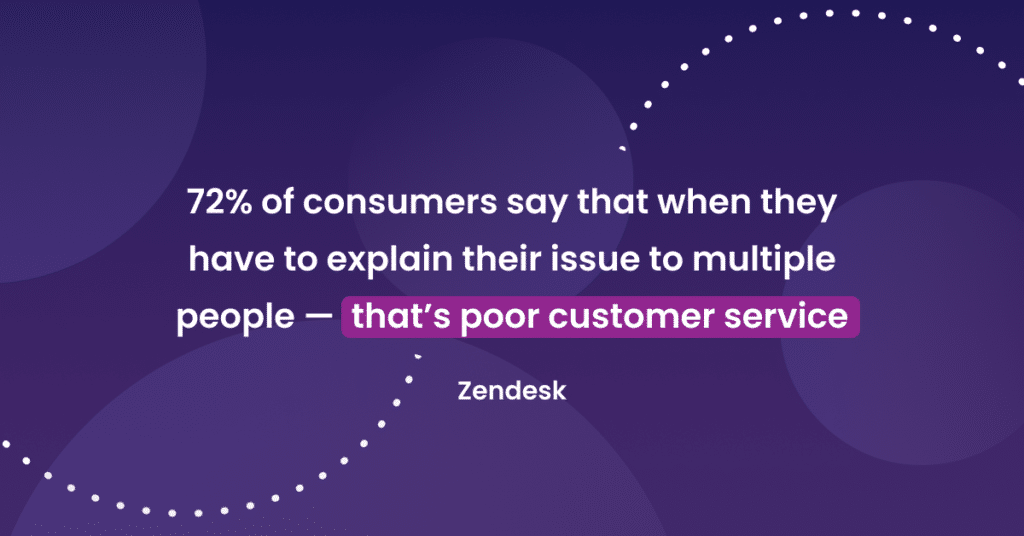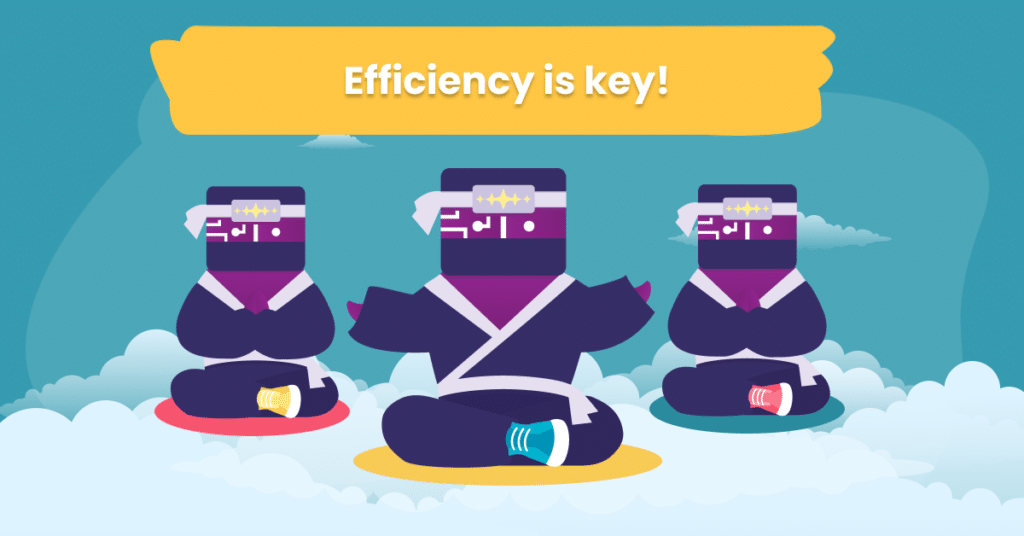Customer operations are not a new trend. For the past few years, we’ve been hearing about the shift towards customer-centricity. Companies are now more focused on understanding customers and meeting their needs and expectations.
Many businesses have realized that keeping a customer happy is just as important as getting them in the door in the first place. They are what keeps the lights on and the doors open — without them, there isn’t much of a reason for having a business. What good are customers if they don’t come back though?
To build a business, you need customer loyalty. For the latter to happen, you need a team of customer service agents who can hold the frontline day and night, tending to the needs and concerns of your customers.
But what if your agents constantly get distracted on spreadsheets and arguments about how to manage a specific case?
Empowered and enabled agents is the answer here, this is what makes successful customer operations.
Here’s why.
What is customer operations?
Customer service operations management is an umbrella term that encompasses all the activities and processes a company uses to support its customers, from their first point of contact with the company—be it an advertisement, website visit, or Google search—to their last.
Customer operations teams are responsible for making sure the customer and prospect experience is seamless and satisfying throughout the customer journey. They often work very closely with marketing, analytics, sales, and customer service teams to develop strategies and tactics to engage current customers as well as attract potential new ones.
The main objective of any customer operations team is simple: turn every interaction between a customer or prospect and the brand into a positive one.

Why are customer operations important?
Let’s back up for a second.
Why are customer success operations important?
Because they represent the direct relationship between your product and its users. Customer operations are often the first contact point when things go wrong and can be a valuable resource for learning how to improve your product or service. When done right, customer success is what keeps customers coming back to your business.
Given that five out of six customers will choose a competitor if another company offers better customer service, it’s safe to say that taking care of customers is pretty important.
The benefits of investing in those relationships go beyond simply retaining customers, though — they are also an opportunity to stand out from the competition.
A well-oiled support team will help you build a better business by providing timely feedback on user experience and giving you valuable insights into new ways to use your product or where improvements can be made. Customer support may seem like an afterthought at times but it actually plays an integral role in building good products with happy users!
So, here are the main benefits you will see coming from reliable customer operations management:
Customer satisfaction
Providing excellent customer service is key to keeping customers happy and loyal. According to a study by HubSpot, 93% of customers are likely to make repeat purchases with companies that offer excellent customer service.
Good customer operations management ensures that customers are treated well throughout their interactions with your company, which helps to build trust and increase satisfaction.
Brand reputation
Good customer operations management can also help to build a positive brand reputation. When customers have a positive experience with your company, they are more likely to recommend your products or services to others.
According to a study by Zendesk, 88% of customers say that they are influenced by online reviews when making a buying decision. By providing excellent customer service, you can encourage positive reviews and improve your brand’s reputation.
Customer retention
Effective customer operations management can also help to improve customer retention. By providing good customer service, you can reduce customer churn and increase customer loyalty.
According to a study by Bain & Company, increasing customer retention rates by just 5% can increase profits by 25% to 95%. By focusing on customer operations management, you can reduce customer churn and boost your bottom line.
Competitive advantage
Good customer operations management can also give your company a competitive advantage. By providing better customer service than your competitors, you can differentiate yourself in the market and attract new customers.
According to a study by American Express, 86% of customers are willing to pay more for a better customer experience. By providing excellent customer service, you can increase your customer base and revenue.
What is the difference between customer service and operations?

In the early days of your business, it’s likely that you’re the one single-handedly handling all customer requests. Fast forward a few years (and a few thousand customers), and your overflowing email inbox is no longer practical to manage.
At this point, many businesses move away from email communication and instead leverage tools like support@email.com or Intercom, which provide faster response times and a more user-friendly interface for agents to respond to customers in an organized way.
With the evolution of these tools, many companies build out dedicated customer service teams to handle incoming inquiries, oftentimes hiring remote customer agents that are trained on how to handle requests within specific business rules. This is what most people commonly refer to as “customer support” — but there’s actually more than meets the eye!
While customer service is often seen as the team that handles incoming requests from customers – technically speaking, customer support operations is responsible for developing processes, tools, and systems that drive better experiences for both agents AND customers.
And unlike traditional “frontline customer service roles (which focus on responding to individual requests), customer operations roles tend to be more senior – requiring heavy analytical thinking and cross-functional collaboration with other departments across the organization (e.g., marketing).
How to improve customer operations management?
Customer support is a crucial part of any successful business. It can be the backbone that keeps everything running smoothly and retains your customers, especially when problems arise.
Empowering customer service agents individually is important, but you also need to empower the whole team, as a collective, so they don’t have to work in their own bubbles. And there is a simple explanation to why this is so important.

72% of consumers say that when they have to explain their issue to multiple people — that’s poor customer service, Zendesk found. Your team, therefore, needs to be able to handle a request upon first contact, without throwing the customer’s call around like a hot potato.
But if you’re not managing your customer operations well, or you don’t have a process in place to manage them well, it’s easy to lose sight of your customer service goals and make mistakes. So how do you improve operations management in customer service?
Here are some things you should think about:
Improve your knowledge base
Whether you’re using a support ticket system or just email, if your team is frequently answering the same questions over and over again, there’s an opportunity to boost efficiency by assembling a knowledge base that’s easily accessible for customers and employees.
A knowledge base is a critical component of any customer operations management strategy. A knowledge base can help you improve your response times and reduce customer churn rates.
According to a survey by Aspect Software, 72% of customers expect customer service representatives to know their contact information, product information, and service history.
By improving your knowledge base, you can ensure that your customer service representatives have the information they need to provide better customer support.
Focus on customer success
Customer success is about helping your customers achieve their goals. By focusing on customer success, you can create a better customer experience and increase customer loyalty.
According to a study by Deloitte, customer-centric companies are 60% more profitable than companies that don’t focus on the customer.
To focus on customer success, you should understand your customers’ needs and goals, and align your products and services to meet those needs. By prioritizing customer success, you can differentiate yourself from your competitors and create a better customer experience.
Find the right people
Hire right — if a company hires people who genuinely care about their customers’ success and happiness, they’ll be more likely to provide great service than someone who just wants to make her quota for the day.
If one of your goals as a business is to create loyal customers, consider hiring for empathy, not just for skills; it’s better to hire someone with great communication skills and a friendly demeanor who knows less about your product, than someone who knows everything but isn’t actively invested in good service.
Have an effective process in place

An effective process is critical to providing great customer support. You should have a clear process for handling customer inquiries and complaints, and your team should be trained on this process.
According to a study by NewVoiceMedia, 47% of customers will take their business to a competitor within a day of experiencing poor customer service. By having an effective process in place, you can reduce the risk of losing customers due to poor customer service.
In fact, every company should have a solid process behind its approach toward a customer operations strategy— even if it’s not written down anywhere, it still exists!
Make sure the way you’re operating is working best for both your customers (in terms of quality of support) and your team (in terms of time spent).
A typical customer operations meaning usually presupposes that you fine-tune processes like quality assurance, performance management, coaching, and reporting so your agents can focus on doing what matters most — caring for the customers and holding the frontline. You need to establish effective customer service processes and customize a toolbox for them to rely on when tending to the needs of your customers.
The right software makes it easy to track responses and escalate issues when necessary; this frees up employees to focus on resolving problems rather than creating reports or updating spreadsheets about how many tickets were closed each week.

Help customers help themselves
The goal isn’t always resolution—it can also be making sure customers know how they can resolve their issues themselves through documentation, FAQ pages on websites etc., which will save time and energy both now and into the future.
If there is one greatest enemy to great customer service it would have to be waiting. Everybody hates waiting, especially when you have a pressing matter to resolve. This is why enabling customers to have their problems fixed in the easiest and quickest way possible is what you should be striving for.
Self-service options like knowledge bases, FAQs, and chatbots can help customers resolve issues quickly and easily. According to a study by SuperOffice, 70% of customers expect a company’s website to include a self-service application.
By providing self-service options, you can improve your response times and reduce the workload on your customer service team. Self-service options also empower customers to find solutions to their problems independently, which can improve customer satisfaction.
Measure your success
To continuously improve your customer operations management, you need to measure your success. Keep track of your team’s response times, resolution rates, and customer satisfaction scores. According to a study by HubSpot, businesses with high customer satisfaction scores are 50% more likely to grow than their peers with lower scores.
By measuring your success, you can identify areas where you need to improve and make changes that will benefit your customers.
Use automation

Automation can help you streamline your customer operations management. Use tools like chatbots and automated email responses to handle simple queries and FAQs, freeing up your team to focus on more complex issues.
According to a study by Forrester, 53% of businesses plan to use chatbots to improve customer support in the next five years. By using automation, you can reduce response times and improve customer satisfaction.
Encourage feedback
Encourage your customers to provide feedback on your customer operations management. This can help you identify areas where you need to improve and make changes that will benefit your customers.
According to a study by Zendesk, 90% of customers say that positive reviews influence their buying decisions. By encouraging feedback, you can improve your reputation and attract new customers. Make it easy for customers to provide feedback by using customer surveys, feedback forms, or social media channels.
After all, customer operations is the anchor that holds everything together.
The quality of customer operations — and all the processes and systems that support it—will either empower your team and enable a good experience for your customers, or it will lead to inefficiencies, missed or late support, or cause customers to churn.
No matter how far you get along the customer operations continuum, it always starts and ends with an attitude. If you have an open mind, a healthy curiosity, and a little excitement for what’s next, you’re already off to quite a strong start.
But knowing how to effectively measure and scale customer support will help ensure your business always enjoys a high level of customer satisfaction.
See how Kaizo can help you on the journey!




